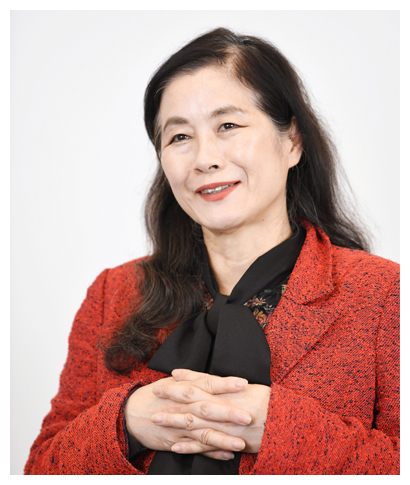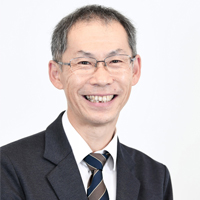Jul. 24, 2025 Perspectives Other
Doing unconventional science
Interview with Motoko Kotani, Executive Director of Science, Pioneering Science Domain
To leverage RIKEN’s comprehensive capabilities and to conduct more effective management with a stronger strategic focus, a new system was introduced in fiscal year 2025. It consists of five research domains—Pioneering Science; Mathematical, Computational and Information Science; Life Science; Sustainable Science; and Physical Science. Each research domain is led by an Executive Director of Science, an internationally outstanding scientist who possesses extremely high expertise both academically and in research management. These Executive Directors of Science encourage cross-disciplinary collaboration based on advanced specialized knowledge, accelerating the creation of new knowledge. Supporting research promotion alongside the five Executive Directors of Science are the Promotion Division Directors.
We asked about the goals of each domain from both researchers’ and administrative departments’ perspectives.
- Pioneering Science Domain
- This domain aims to contribute to the dramatic advancement of science and technology and the creation of new value; to international brain circulation through the creation of networks with top-class research institutions and researchers; and to the training of outstanding young researchers.

Motoko Kotani
Executive Director of Science, Pioneering Science Domain
Over a century ago, Dr. Jokichi Takamine, who proposed the founding of RIKEN in Japan, declared that: “Japanese researchers must not simply imitate the West, but instead carry out research based on their own originality.” This pioneering spirit remains at the core of RIKEN today. At the same time, today’s RIKEN, as a national research and development agency, also carries out research in line with key national policies. Currently, RIKEN operates 22 research centers and other programs dedicated to advancing important fields deemed vital to the nation’s progress.
Nurturing the seeds of future projects
The Pioneering Science Domain plays a key role in generating new research fields that may one day grow into large-scale national projects and evolve into full-fledged research centers. Researchers from diverse disciplines collaborate on long-term efforts to give form to new and as-yet-undefined ideas, constantly taking on challenges from a forward-looking perspective.
The sole center within the Pioneering Science Domain is the Pioneering Research Institute. This structure is rooted in RIKEN’s unique system of “Chief Scientist Laboratories,” which dates back to 1921 and laid the foundation for what RIKEN is today. Under this system—remarkable for its time—research themes, generous budgets, and personnel decisions were entrusted not to departments but directly to Chief Scientists heading individual labs. This revolutionary approach transformed RIKEN into a “paradise for scientists,” fostering free and vigorous discussions that gave rise to groundbreaking ideas.
I served as an Executive Director of RIKEN from 2017 to 2022. What struck me most during that time was RIKEN’s steadfast commitment to the pioneering spirit—its firm stance that “we do not pursue research that anyone could achieve given enough time and money; we pursue ambitious research.” I want to help create mechanisms that preserve and strengthen this spirit.
At the Pioneering Research Institute, researchers from various fields come together, serving as bridges across different areas of study. This role is quite similar to that of the TRIP Headquarters, which also aims to foster “science that connects” across disciplines. My understanding is this: TRIP provides a platform under which researchers gather around clearly defined, crucial themes to advance joint projects. The Pioneering Science Domain, on the other hand, is a space where diverse individuals engage in ongoing dialogue across fields, each striving to create new, unconventional forms of science. Both approaches are essential for scientific progress.
I am a mathematician. At Tohoku University, I also served as Director of the Advanced Institute for Materials Research— perhaps an unexpected appointment, given my background. There, researchers in metallurgy, applied physics, chemistry, life sciences, and other disciplines work together to develop materials with exceptional functionalities. When I was first asked to lead the institute, I hesitated. But mathematics is often described as the universal language of science. It helps articulate tacit knowledge— what researchers grasp intuitively—in a way that can be shared with others. It connects disciplines and contributes to the advancement of science. This role allowed me to put that belief into practice, and I hope to bring that same experience and perspective to my work here as well.
Science is future-oriented—and it is shaped by the young
The world is undergoing profound transformations. Science itself—now larger in scale and more complex than ever—is experiencing a kind of tectonic shift. Traditional disciplines are merging and giving rise to entirely new forms of science. At the same time, expectations toward science and technology are becoming more diverse, and meeting these expectations requires a corresponding diversity in scientific approaches.
We are now being called upon to pioneer new fields by encouraging encounters among researchers from different disciplines. International collaboration is also more important than ever. Science, by its very nature, is future-oriented— and it is something to be created by the younger generation. I want to help create an environment where ambitious ideas can flourish—ideas so bold that people will say, “That’s impossible!”—and where young scientists are empowered to take on such challenges.

Koki Sorimachi
Division Director, Pioneering Science Promotion Division
Unlike working at a research center with a clearly defined field of study, this domain brings together researchers from entirely different backgrounds—it's a space where the outcomes are unpredictable. At first, it was a real challenge just to keep track of who was working on what. But having been involved in the predecessor of this domain, I’m fully committed to supporting it with everything I’ve got.
Rate this article
